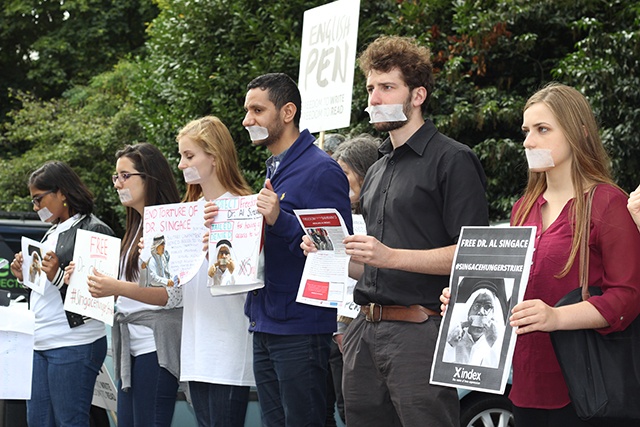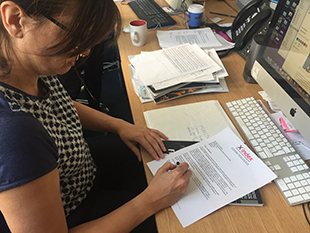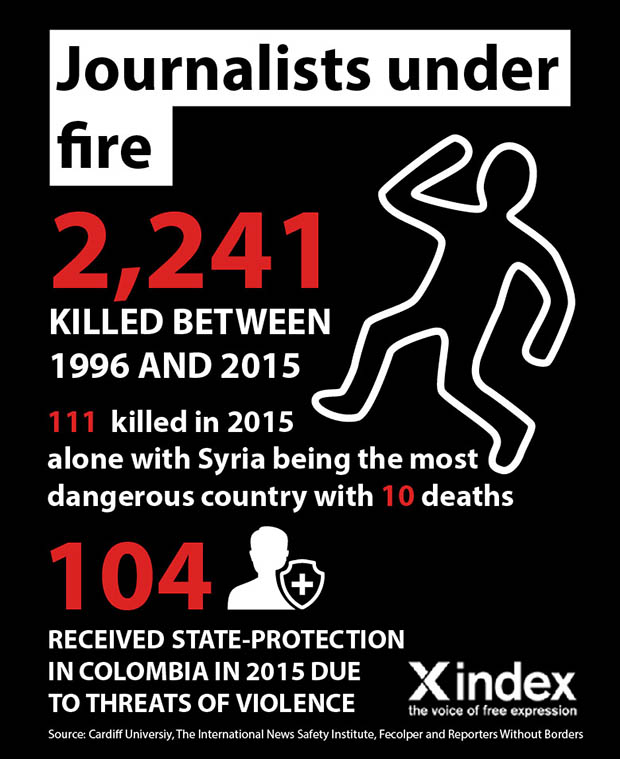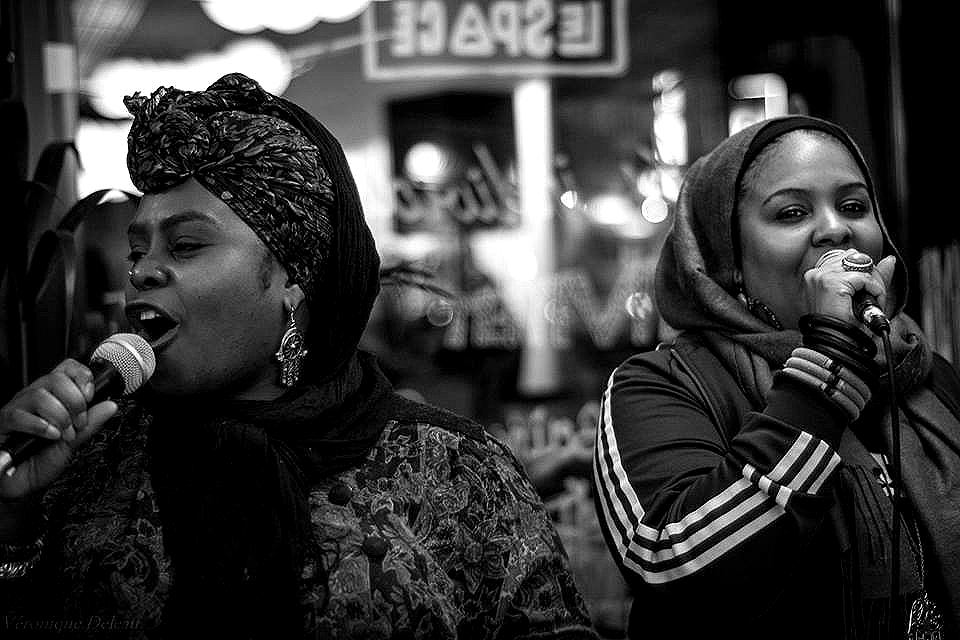Index relies entirely on the support of donors and readers to do its work.
Help us keep amplifying censored voices today.

Protesters in London demand the release of Abduljalil al-Singace, July 2015.
One year has passed since Index on Censorship magazine editor Rachael Jolley sent a copy of the publication – Fired, Threatened, Imprisoned… Is Academic Freedom Being Eroded? – to jailed Bahraini academic, human rights activist and writer Abduljalil al-Singace to mark his 150 days on hunger strike.
Al-Singace’s hunger strike ended on 27 January 2016 after 313 days, but he remains in prison.
In a letter accompanying the magazine, Jolley aired concerns that al-Singace – who had been protesting prison conditions while being held in solitary confinement – had suffered torture and called on the Bahraini authorities to ensure he “had access to the medical treatment he urgently requires”.

Index magazine editor Rachael Jolley pens letter to Bahrain’s Ministry of Interior regarding al-Singace, 17 August 2015.
On 15 March 2011 Bahrain’s king brought in a three-month state of emergency, which included the through establishing of military courts known as National Safety Courts. The aim of the decree was to quell a series of demonstrations that began following a deadly night raid on 17 February 2011 against protesters at the Pearl Roundabout in Manama, when four people were killed and around 300 injured.
Over 300 individuals were subsequently convicted through National Safety Courts, often for speaking out against the government or exercising their right to assemble freely. Many were punished simply for supporting or being part of the country’s opposition movement.
On a midnight raid at his home on 17 March 2011, al-Singace was arrested at gunpoint. During the arrest, he was beaten, verbally abused and his family threatened with rape. Disabled since his youth, al-Singace was forced to stand without his crutches for long periods of time during his arrest. Masked men also kicked him until he collapsed. The Bahraini authorities placed him in solitary confinement for two months. During this time the guards starved him, beat him and sexually abused him.
Al-Singace is part of what is known as the Bahrain 13, a group of peaceful activists and human rights defenders imprisoned in Bahrain in connection with their role in the February 2011 protests.
On 22 June 2011 a military court sentenced all members of the Bahrain 13 to between five years and life in prison, on trumped-up charges of attempting to overthrow the regime, “broadcasting false news and rumours” and “inciting demonstrations”.
Evidence used against them was extracted under torture, but this didn’t prevent their sentences being upheld on appeal in September 2011, at a civilian court in May 2012 and in January 2013 at the Court of Cassation. The Bahrain 13 has now exhausted all domestic remedies and are currently serving their sentences Jau prison, notorious for torture and ill treatment.
During their arrest and detention, the Bahrain 13 were subject to beatings, torture, sexual abuse and threats of violence and rape towards themselves and members of their family by police and prison authorities. Eleven of the 13 remain in prison.
The group consists of:
Al-Singace
Sheikh Abduljalil al-Muqdad, a religious cleric and a co-founder of the al-Wafaa Political Society. During his detention he has been beaten, tortured and told his wife would be raped.
Abdulhadi al-Khawaja, a human rights activist and co-founder of the Bahrain Center for Human Rights. On 8 February 2012, he began a hunger strike to protest his wrongful detention and treatment in prison. He ended his hunger strike after 110 days on 30 May 2012. He went on hunger strike again in April 2015 to protest against the torture of prisoners at Jau.
Salah al-Khawaja, a prominent human rights activist, marriage consultant and the brother of Abdulhadi. The government previously arrested Salah in the 1980’s and 1990’s for engaging in political activity against the government. He was released on 19 March 2016.
Abdulhadi al-Makhdour, a religious cleric and political activist. Authorities prevented him from showering and performing his daily prayers. They spat in his mouth and forced him to swallow. They also denied him access to a lawyer and barred him from contacting his family.
Mohammed Habib al-Muqdad, a religious cleric and the president of the al-Zahraa Society for Orphans. During his time in prison he was sexually assaulted with sticks and forced to gargle his own urine. Security guards also electrocuted him on his body and genitals.
Mohammed Ali Ismael, a prominent political activist in Bahrain. During his imprisonment, he has been beaten and verbally abused.
Abdulwahab Hussain, a life-long political activist and leader of the Al Wafaa political opposition society. He was previously detained for six months in 1995 and for five years between 1996 and 2001. He was diagnosed with multiple peripheral polyradiculoneuropathy, a condition which affects the body’s nerves, in 2005 and suffers from sickle-cell disease and chronic anaemia. His health conditions have worsened as a direct result of the torture and ill-treatment, while medicine and treatment have been denied to him. During his current sentence he has contracted numerous infections.
Mohammed Hassan Jawad, human rights activist who campaigns for the rights of detainees and prisoners who has been jailed a number of times since the 1980s. During his current imprisonment, he was electrocuted and beaten with a hose.
Sheikh Mirza al-Mahroos, a religious cleric, a social worker, and the vice-president of the al-Zahraa Society for Orphans. During his time in prison, Al-Mahroos has been denied medical treatment for severe pain in his legs and stomach. Despite having the proper documentation, he was not permitted to visit his sick wife, who later died in early 2014.
Hassan Mushaima, a political activist and leader of the Al Haq opposition society in Bahrain who has been arrested several times for his pro-democratic activities. He was diagnosed with lung cancer in 2010, which he was successfully treating at the time of his arrest. Medical results have been denied to him in prison.
Sheikh Saeed al-Noori, a religious cleric and member of the al-Wafaa Political Society. During his detention he has been tortured, forced to stand for long periods of time and had shoes stuffed in his mouth.
Ebrahim Sharif, the former president of the National Democratic Action Society. He is a political activist and has campaigned for democratic reform and equal rights. On 19 June 2015, Sharif was released following a royal pardon, only to be rearrested on 12 July 2015. He was charged with “inciting hatred against the regime” for a speech he delivered in commemoration of 16-year-old Hussam al-Haddad, who was shot and killed by police forces in 2012. He was released again in July 2016 and remains out of prison but the Bahrain Institute for Rights and Democracy he is at risk of being arrested again because of an appeal by prosecutors.
Source: The Bahrain Institute for Rights and Democracy.
Also read:
– Bahrain continues to use arbitrary detention as a weapon to silence critics
– Bahrain: critics and dissidents still face twin threat of statelessness and deportation
When you hear the words “hip hop”, you may think about girls, guns and the other usual stereotypes that haunt the genre. Your mind is much less likely to wander to the dusty tomes of academia. Yet if the Power of Hip Hop proved anything, it’s that through a unique mix of academic presentations and live performances, hip hop’s capacity for facilitating social change across the world is undeniable.
The two-day event, co-organised by Index on Censorship and In Place of War, began with a day of academic presentations that proved hip hop is as worthy an avenue of study as any other musical genre. A new paper by Veronica Mason, a lecturer at London Metropolitan University who spoke at the event, will be the first inter-generational study of hip hop in academia, and having a platform to share that with other hip-hop academics is invaluable.
Then came a day of performances from the likes of Zambezi News, two satirists and hip hop artists from Zimbabwe who had the whole venue laughing over their impression of Mugabe, and Shhorai, a Colombian MC and microbiology researcher. Shhorai rhapsodised about being in the UK, telling Index how willing Londoners are “to give you a hand, to smile, to help you”. In fact, this solidarity that In Place of War has helped to cultivate over the past decade seems to have generated a real sense of female solidarity in Shorrai: “We need to support each other because it’s the only way that we’re going to move forward.”
When asked what the Colombian touch in hip hop was, her answer was immediate: “The best exponents of Colombian hip hop are great freestylers. But there are very few women because the battles are sexist. The guys just say ‘it’s a gathering of witches, nothing more.’”
But no one had anything negative to say in RichMix when she performed along with Poetic Pilgrimage, a frank, Muslim female duo. In fact, the audience went on to happily digest what was an appropriately heavy second day of the event when figures like Afrikan Boy and Rodney P freestyled about the recent shootings in the US. Having talked about how “music is my visa”, the gang-ridden streets of Afrikan Boy’s youth seemed closer than ever as he talked about seeing Alton Sterling’s bereaved son break down at the press conference. “I had to just sit down and cry those tears. It struck me as a father. I thought – my life’s going to get taken away for that?”
“No justice, no peace, persecute the police,” was the thoughtful, provocative refrain of his rap that held the audience in the palm of his hand.
A genre that began with a party Bronx in the 1970s has, without a doubt, gone on to transform lives across the world. Whether you grew up in Colombia or London, Zimbabwe or Bristol, it is a genre that enriches the impoverished, educates the deprived and represents the unrepresented. After such an empowering weekend, all that’s left to wish for is that their voices will be heard.
“We’re Zimbabwe’s leading satirical show. We’re also Zimbabwe’s only satirical show” Zambezi News on fleek ✌?️? pic.twitter.com/QbXu8u2U4v
— Sophia Smith Galer (@sophiasgaler) July 8, 2016
Clip of @SHHORAI rapping at #PowerOfHipHop @RichMixLondon @IndexCensorship @inplaceofwar #conocimiento #callejero ? pic.twitter.com/MH8fDzZio2
— Sophia Smith Galer (@sophiasgaler) July 8, 2016
More from the Power of Hip Hop:
– Poetic Pilgrimage: Hip hop has the capacity to “galvanise the masses”
– Colombian rapper Shhorai: “Can you imagine a society in which women have no voice?”
– Zambezi News: Satire leaves “a lot of ruffled feathers in its wake”
– Jason Nichols: Debunking “old tropes” through hip hop
[vc_row][vc_column][vc_column_text]
The truth is in danger. Working with reporters and writers around the world, Index continually hears first-hand stories of the pressures of reporting, and of how journalists are too afraid to write or broadcast because of what might happen next.
In 2016 journalists are high-profile targets. They are no longer the gatekeepers to media coverage and the consequences have been terrible. Their security has been stripped away. Factions such as the Taliban and IS have found their own ways to push out their news, creating and publishing their own “stories” on blogs, YouTube and other social media. They no longer have to speak to journalists to tell their stories to a wider public. This has weakened journalists’ “value”, and the need to protect them. In this our 250th issue, we remember the threats writers faced when our magazine was set up in 1972 and hear from our reporters around the world who have some incredible and frightened stories to tell about pressures on them today.
Around 2,241 journalists were killed between 1996 and 2015, according to statistics compiled by Cardiff University and the International News Safety Institute. And in Colombia during 2015 104 journalists were receiving state protection, after being threatened.
In Yemen, considered by the Committee to Protect Journalists to be one of the deadliest countries to report from, only the extremely brave dare to report. And that number is dwindling fast. Our contacts tell us that the pressure on local journalists not to do their job is incredible. Journalists are kidnapped and released at will. Reporters for independent media are monitored. Printed publications have closed down. And most recently 10 journalists were arrested by Houthi militias. In that environment what price the news? The price that many journalists pay is their lives or their freedom. And not just in Yemen.
Syria, Mexico, Colombia, Afghanistan and Iraq, all appear in the top 10 of league tables for danger to journalists. In just the last few weeks National Public Radio’s photojournalist David Gilkey and colleague Zabihullah Tamanna were killed in Afghanistan as they went about their work in collecting information, and researching stories to tell the public what is happening in that war-blasted nation. One of our writers for this issue was a foreign correspondent in Afghanistan in 1990s and remembers how different it was then. Reporters could walk down the street and meet with the Taliban without fearing for their lives. Those days have gone. Christina Lamb, from London’s Sunday Times, tells Index, that it can even be difficult to be seen in a public place now. She was recently asked to move on from a coffee shop because the owners were worried she was drawing attention to the premises just by being there.
Physical violence is not the only way the news is being suppressed. In Eritrea, journalists are being silenced by pressure from one of the most secretive governments in the world. Those that work for state media do so with the knowledge that if they take a step wrong, and write a story that the government doesn’t like, they could be arrested or tortured.
In many countries around the world, journalists have lost their status as observers and now come under direct attack. In the not-too-distant past journalists would be on frontlines, able to report on what was happening, without being directly targeted.
So despite what others have described as “the blizzard of news media” in the world, it is becoming frighteningly difficult to find out what is happening in places where those in power would rather you didn’t know. Governments and armed groups are becoming more sophisticated at manipulating public attitudes, using all the modern conveniences of a connected world. Governments not only try to control journalists, but sometimes do everything to discredit them.
As George Orwell said: “In times of universal deceit, telling the truth is a revolutionary act.” Telling the truth is now being viewed by the powerful as a form of protest and rebellion against their strength.
We are living in a historical moment where leaders and their followers see the freedom to report as something that should be smothered, and asphyxiated, held down until it dies.
What we have seen in Syria is a deliberate stifling of news, making conditions impossibly dangerous for international media to cover, making local news media fear for their lives if they cover stories that make some powerful people uncomfortable. The bravest of the brave carry on against all the odds. But the forces against them are ruthless.
As Simon Cottle, Richard Sambrook and Nick Mosdell write in their upcoming book, Reporting Dangerously: Journalist Killings, Intimidation and Security: “The killing of journalists is clearly not only to shock but also to intimidate. As such it has become an effective way for groups and even governments to reduce scrutiny and accountability, and establish the space to pursue non-democratic means.”
In Turkey we are seeing the systematic crushing of the press by a government which appears to hate anyone who says anything it disagrees with, or reports on issues that it would rather were ignored. Journalists are under pressure, and so is the truth.
As our Turkey contributing editor Kaya Genç reports on page 64, many of Turkey’s most respected news outlets are closing down or being forced out of business. Secrets are no longer being aired and criticism is out of fashion. But mobs attacking newspaper buildings is not. Genç also believes that society is shifting and the public is being persuaded that they must pick sides, and that somehow media that publish stories they disagree with should not have a future.
That is not a future we would wish upon the world.
Order your full-colour print copy of our journalism in danger magazine special here, or take out a digital subscription from anywhere in the world via Exact Editions (just £18* for the year). Each magazine sale helps Index on Censorship fight for free expression worldwide.
*Will be charged at local exchange rate outside the UK.
Magazines are also on sale in bookshops, including at the BFI and MagCulture in London, Home in Manchester, Carlton Books in Glasgow and News from Nowhere in Liverpool as well as on Amazon and iTunes. MagCulture will ship anywhere in the world.
[/vc_column_text][/vc_column][/vc_row][vc_row][vc_column][vc_custom_heading text=”From the Archives”][vc_row_inner][vc_column_inner width=”1/3″][vc_single_image image=”94291″ img_size=”213×289″ alignment=”center” onclick=”custom_link” link=”http://journals.sagepub.com/doi/pdf/10.1080/03064228208533353″][vc_custom_heading text=”Afghanistan in 1978-81″ font_container=”tag:p|font_size:24|text_align:left” link=”url:http%3A%2F%2Fjournals.sagepub.com%2Fdoi%2Fpdf%2F10.1080%2F03064228208533353|||”][vc_column_text]April 1982
Anthony Hyman looks at the changing fortunes of Afghan intellectuals over the past four or five years.[/vc_column_text][/vc_column_inner][vc_column_inner width=”1/3″][vc_single_image image=”94251″ img_size=”213×289″ alignment=”center” onclick=”custom_link” link=”http://journals.sagepub.com/doi/pdf/10.1080/03064228208533410″][vc_custom_heading text=”Colombia: a new beginning?” font_container=”tag:p|font_size:24|text_align:left” link=”url:http%3A%2F%2Fjournals.sagepub.com%2Fdoi%2Fpdf%2F10.1080%2F03064228208533410|||”][vc_column_text]August 1982
Gabriel García Márquez and others who faced brutal government repression following the 1982 election.[/vc_column_text][/vc_column_inner][vc_column_inner width=”1/3″][vc_single_image image=”93979″ img_size=”213×289″ alignment=”center” onclick=”custom_link” link=”http://journals.sagepub.com/doi/pdf/10.1080/03064228408533703″][vc_custom_heading text=”Repression in Iraq and Syria” font_container=”tag:p|font_size:24|text_align:left” link=”url:http%3A%2F%2Fjournals.sagepub.com%2Fdoi%2Fpdf%2F10.1080%2F03064228408533703|||”][vc_column_text]April 1983
An anonymous report from Amnesty point to torture, special courts and hundreds of executions in Iraq and Syria. [/vc_column_text][/vc_column_inner][/vc_row_inner][vc_separator][/vc_column][/vc_row][vc_row][vc_column width=”1/3″][vc_custom_heading text=”Danger in truth: truth in danger” font_container=”tag:p|font_size:24|text_align:left” link=”url:https%3A%2F%2Fwww.indexoncensorship.org%2F2016%2F05%2Fdanger-in-truth-truth-in-danger%2F|||”][vc_column_text]The summer 2016 issue of Index on Censorship magazine looks at why journalists around the world face increasing threats.
In the issue: articles by journalists Lindsey Hilsum and Jean-Paul Marthoz plus Stephen Grey. Special report on dangerous journalism, China’s most famous political cartoonist and the late Henning Mankell on colonialism in Africa.[/vc_column_text][/vc_column][vc_column width=”1/3″][vc_single_image image=”76282″ img_size=”medium” alignment=”center” onclick=”custom_link” link=”https://www.indexoncensorship.org/2016/05/danger-in-truth-truth-in-danger/”][/vc_column][vc_column width=”1/3″][vc_custom_heading text=”Subscribe” font_container=”tag:p|font_size:24|text_align:left” link=”url:https%3A%2F%2Fwww.indexoncensorship.org%2Fsubscribe%2F|||”][vc_column_text]In print, online. In your mailbox, on your iPad.
Subscription options from £18 or just £1.49 in the App Store for a digital issue.
Every subscriber helps support Index on Censorship’s projects around the world.
![]() SUBSCRIBE NOW[/vc_column_text][/vc_column][/vc_row]
SUBSCRIBE NOW[/vc_column_text][/vc_column][/vc_row]

Poetic Pilgrimage formed in 2002 when Muneera Williams and Sukina Owen-Douglas met at secondary school in Bristol, where they were part of a choir. Their love of music brought them together, but it was Williams, who was a DJ at a pirate radio station, who started Owen-Douglas on the path of hip hop by introducing her to artists such as Mos Def, Talib Kweli, Nas and Slum Village.
Following their conversion to Islam 11 years ago, Poetic Pilgrimage continued to make music despite facing criticism by those who considered their music to be haram, or forbidden by Islamic law. The pair now use their music as a tool to tackle all kinds of prejudices.
Poetic Pilgrimage will be performing at The Power of Hip Hop on 9 July. The event, co-organised by Index on Censorship, will explore the influence of hip-hop culture on social change in a global context. Performers include the inaugural Music in Exile Fellow Smockey, plus Zambezi News, Shhorai and Jason Nichols.
Index caught up with Poetic Pilgrimage ahead of the event to find out what it is like to be female and Muslim in the UK hip-hop scene.
Also read:
– Colombian rapper Shhorai: “Can you imagine a society in which women have no voice?”
– Zambezi News: Satire leaves “a lot of ruffled feathers in its wake”
– Jason Nichols: Debunking “old tropes” through hip hop
A conference followed by a day of performance to consider hip hop’s role in revolutionary social, political and economic movements across the world.